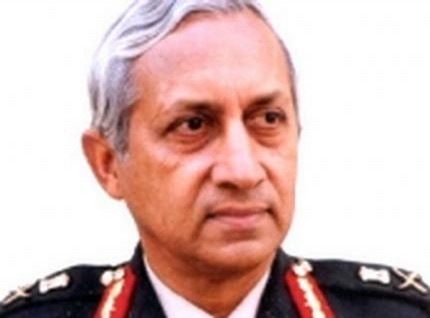
London, October 2: Lt Gen K S Brar, who was assaulted by four people in central London on Sunday night, is convinced that it was an attempt to assassinate him by " pro-Khalistan elements" for his role in the 1984 "Operation Bluestar".
Brar, who kicked and fought three of the four assailants, suffered a knife wound in the neck and is recovering after receiving medical treatment at a London hospital soon after the attack near the busy Marble Arch area. He is due to return to India on Tuesday.
"This was a pure assassination attempt on me. Even on Internet there are so many threats being sent to me to say that there have been many attempts on your life but they haven't succeeded, but the next one will succeed. They've been after me." Brar told a television channel on Monday night.
"On 6th of June, which is the anniversary of Bluestar every year, particularly in London, the radical Sikhs come out in procession with banners and make pledges to kill me. So it was a pure assassination attempt," he said.
Brar said it was "obvious" that the assailants were Khalistan sympathisers, who, he added, wanted to kill him since "Operation Bluestar".
Describing the incident, the 78-year-old Brar said he fought with the assailants, with "abnormal strength", and added: "Now when I think back I can't imagine how I fought with those three big guys. But I suppose being a soldier and having been in the army for so many years, one learns to defend oneself".
One of the four assailants, he said, separated his wife from him, while the other three "went for me". His wife fell down when one of the assailants pushed her against the wall, he said.
Everything happened within a couple of minutes, "maybe one minute", he said.
The police, Brar said, had told him that a mobile phone had been recovered from the site of assault, which may lead them to the assailants.
The retired Lt General praised the police and hospital authorities who treated him after the assault.
Operation Bluestar was aimed at flushing out Sikh terrorists led by Jarnail Singh Bhindrawale from the Golden Temple, who was demanding a separate state for Sikhs called Khalistan.
A decorated soldier, Brar saw action in the 1971 war with Pakistan, and was among the first to enter Dhaka when the Indian Army forced Pakistani army into surrender.
General A S Vaidya who was the Army chief in 1984 planned the highly controversial Operation Bluestar. Vaidya was shot dead in Pune in 1986.
Brar assailants had 'long beards': Police
Scotland Yard has appealed for information from members of the public on the Sunday night assault on Lt Gen K S Brar, and described the four assailants as wearing dark clothing, long black jackets and having "long beards".
Stating that detectives were keeping an open mind on the motivation behind the attack, the police said in a statement on Monday that they were particularly keen to speak to people who assisted Brar and his wife after the attack on Old Quebec Street in central London.
No arrests had been made until last night, the police said.
"The four men are described as wearing dark clothing and long black jackets. They all had long beards. One of the men is described as younger and slimmer than the other three. They all fled in the direction of Oxford Street," the statement said.
"Detectives are keen to speak to anyone who was in the area at the time or who may have information about the incident. In particular they want to speak to those people who assisted the wife and the victim at the scene following the attack," it added.
According to Brar, a mobile phone had been recovered from the scene, which may help lead the police to the assailants. The police were also expected to go through CCTV footage from the area that has several cameras.






Comments
Add new comment